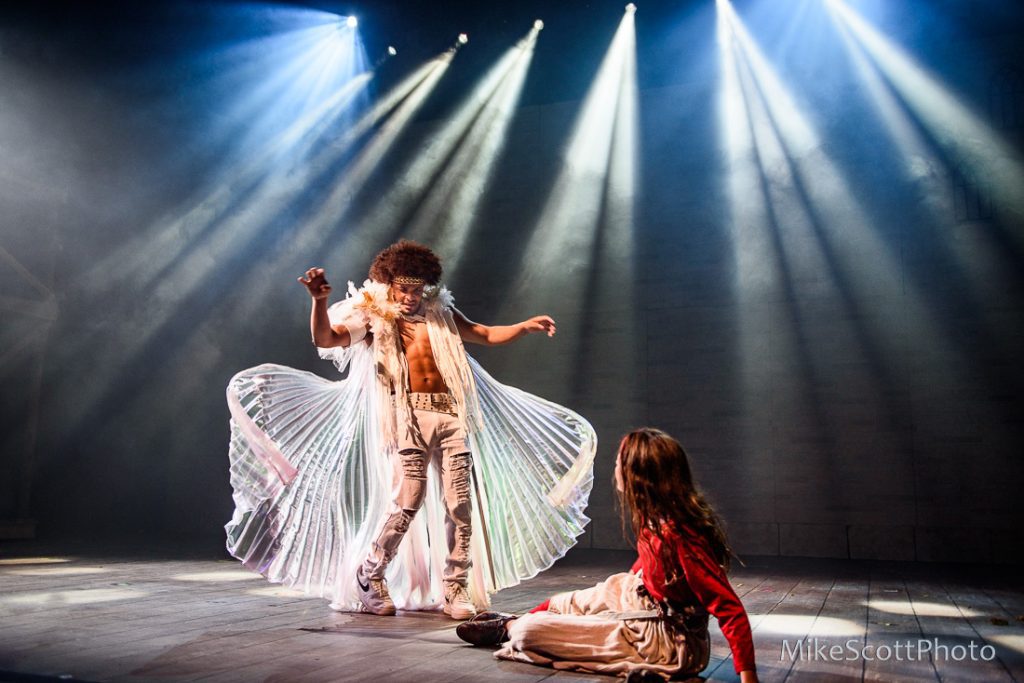
August 8, 2023 By The Company Theatre
The Company Theatre announces the world premiere of its original production, Born to Do This – The Joan of Arc Rock Opera, bringing the legendary girl’s extraordinary life to the stage. This contemporary sung-through musical comes alive as an ordinary 15th-century girl’s miraculous experiences strengthened her passion to lead an army and save her people.
Award-winning playwright and co-founder of The Company Theatre, Zoe Bradford enlisted Melissa Carubia as the composer of this rock musical. Recently, Carubia has been celebrated in the Boston theater scene for composing the music featured in T: An MBTA Musical. Michael Hammond, co-creator with Bradford of the Moss Hart Award winning Paragon Park, joins their team as collaborator. Elliot Norton Award-nominated actress Liza Giangrande, a rising star, adds Joan of Arc to a growing list of film, television, and stage credits. She will portray the play’s iconic hero.

Unveiling Born to Do This will mark an important milestone for Bradford, who garnered 12 awards, including a Lifetime Achievement Award from The New England Theatre Conference. With 44 years as the co-founder and Artistic Director of The Company Theatre, Bradford’s journey to write her first original rock opera has been five years in the making.
“Joan’s story may have started in the 15th century, but her bravery transcends time,” said Bradford. “My greatest artistic joy is creating original works. There is no better inspiration than Joan of Arc, who stood up for her own individuality, became a hero and sacrificed her life to save her people. Joan’s story is attainable and appealing as history comes alive- she is not a saint trapped in a statue. There is humor in this piece, and believability in her humanity. The music, with a full 14-piece orchestra, is incredibly catchy, appealing, and most of all memorable.”

Rachel Padula-Schufelt will set the tone with her creative mix of contemporary and medieval costumes, set against a rich background of moving scenic elements by Ryan Barrow. Even Joan’s warhorse makes an appearance! Dean Palmer Jr. completes the creative team with exciting and glorious lighting effects.
“Joan of Arc was a bold young visionary, a feminist icon for the ages,” says Carubia. “We capture the audacity of her spirit with our modern take on her story, told through a pop rock score both powerful and catchy.”
“Helping to bring Zoe’s vision to life has been one of the most exciting opportunities afforded me by Company Theatre! Add Sally Ashton Forrest’s exhilarating staging and fight choreography and Robert McDonough’s powerful music direction and you have the makings of a night of theatre you will not forget!” exclaims Hammond.

“Now is the time to launch our world premiere as this heroic teenage girl becomes more relevant than ever,” remarked Bradford, “she defied the rules, followed her heart, and changed the course of history.
BORN TO DO THIS: The Joan of Arc Rock Opera opens Friday, July 28, and runs through Sunday, August 20. There are evening and matinée performances available. Tickets are $50 to $58. For a complete list of showtimes, to purchase tickets, or for more information, visit www.companytheatre.com or call the Box Office at 781-871-2787.


This play’s take on Joan of Arc, and the playwright’s claims about the real history, have been contradicted by many historians, since the idea that Joan of Arc “broke all the rules” was just the dishonest claim made by the pro-English tribunal that put her on trial and is contradicted by numerous eyewitness accounts and her own statements. She herself said (during the fourth session of her trial) that she didn’t fight, which is confirmed by eyewitnesses (they routinely said she carried her banner in battle and stayed out of the fighting). She denied calling herself a commander, and the Royal military records and eyewitness accounts make it clear that there was always a nobleman in command. She was a religious visionary in an era when there were many women who had been accepted in that role (e.g. St. Catherine of Siena advised Pope Urban VI). Her “male clothing” was just the soldier’s riding outfit that was given to her to wear for practical reasons by the soldiers who escorted her to Chinon and which she continued wearing in prison so she could keep it “securely laced and tied” to prevent her guards from pulling her clothing off, according to quotes from her relayed by several eyewitnesses. This practical usage was explicitly approved in the standard summaries of medieval Catholic doctrine such as the “Summa Theologica” since the doctrine granted an exemption in cases of necessity. English government records prove the English manipulated her trial and their collaborators falsified the transcript and convicted her on false charges, which the play seems to repeat while ignoring the better evidence we have. She wasn’t a feminist either, as even the feminist historian Helen Castor essentially admitted. Nor was she motivated by “individuality” since she said bluntly that she personally didn’t want to go to the war, and refused for several years until she said the saints in her visions became more forceful. She told one of the soldiers, Jehan de Metz, that “I would prefer to stay home with my poor mother and spin wool”, explaining that she was ordered to leave against her will because “there is no aid except myself” since she had been chosen by God to be the vehicle for saving Charles VII’s cause. The play’s title alludes to this but seemingly in an ironic fashion by borrowing a variation of one of her quotations explaining that God would clear a path through enemy territory so she could reach Charles VII at Chinon because it was for this purpose that she had been born – i.e. to be sacrificed for someone else’s cause, in essense; This is the opposite of promoting one’s own “individuality” since it’s a self-sacrificial act.
Thank you so much, Hingham Anchor. We appreciate your support.